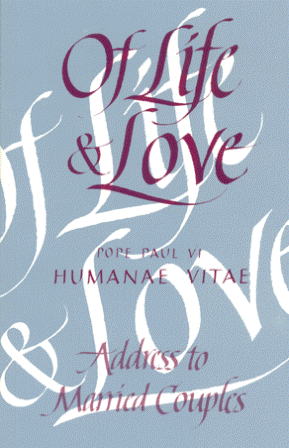- Featured Favorites
Not For Protestants???
by David Bunn
As my wife Stacey and I have tried to be open to God’s will in our lives with respect to children, we have practiced Natural Family Planning (NFP) in our marriage of over twenty years. We have received excellent teaching, advice and encouragement from Sheila St. John in person, and vital medical support from the St. Paul VI Institute for the Study of Human Reproduction. We have benefited from the insights of many others, through books, articles and recorded presentations. Not surprisingly, the vast majority of these resources have come from Roman Catholics. While we are sincerely grateful for everything we have learned from the Catholic world, as Evangelical Christians* we have often wondered why so few of our fellow Evangelicals do not consider NFP, or something at least similar, and seem to practice birth control or get themselves sterilized in the same fashion as their secular neighbors.
This is actually a very involved question, about which scholarly books have been written. For those who are interested, Allan Carlson, a distinguished and reputable Protestant scholar, has written extensively on the history of American Protestant and Evangelical Christian beliefs regarding contraception, sterilization and childbearing. A quick review of Christian history shows that practically all kinds of Christians, from the Roman Catholic Church to the various Protestant denominations that emerged out of the Reformation in the 16th century, to Christian denominations that developed later, agreed that contraception (as well as abortion) was immoral and a violation of God’s plan for married life.
To reference the two most influential Protestant thinkers, Luther and Calvin, both took Genesis 1:28, “be fruitful and multiply and fill the earth” very seriously. Ironically, just as contraception and sterilization are taken for granted today among a majority of Christians, Protestant and Evangelical Christians of the past took it for granted that being open to large families was an important, if not central, aspect of the committed Christian life. Catholics, Protestants, and Orthodox may have disagreed on any number of theological issues, but they agreed that marriage and procreation were created and ruled by God, and that contraception and a contraceptive mentality were a form of disobedience to God’s order.
After centuries, from the birth of the church to the early 20th century, this consensus fell apart. While such profound changes in belief never occur overnight, it does appear to have happened relatively quickly and forcibly. Secularization—the influence of non-Christian ideas—was, not surprisingly, a key factor, as was scientific and technological change. 19th and 20th century Protestant intellectuals, including much of the clergy, were increasingly open to the anti-population and anti-conception ideas coming from secular thinkers. In 1930 at the Lambeth conference of Anglican leaders in England, the bishops voted to allow contraception within marriage in certain specific and restricted circumstances. Allan Carlson believes that Protestant pastors in particular rejected their own churches’ teachings on procreation and birth control and began to limit their family size before any changes on contraception were officially promoted. It is not hard to imagine the rapid spread of contraception and a contraceptive mentality, given that it began chiefly with many leaders and pastors in Protestant churches. By roughly the mid-20th century, many Protestants had abandoned the Christian consensus of the past almost two thousand years, and practiced contraception and sterilization. Extremely telling for the Protestant and Evangelical world, they made this change not from a new understanding of the Bible, the supposed bedrock of the Protestant world, but due to outside influences and expediency. The further development of contraceptive technology intensified this revolution in thinking and practice.
Today, less than a hundred years after the Lambeth Conference in 1930, the topic of the morality of contraception and sterilization, and what one’s Christian faith has to say about procreation within marriage is essentially a non-issue for most Protestants and Evangelical Christians. While there are always interesting and notable exceptions, most Protestant and Evangelical Christians treat contraception and sterilization as purely personal and private matters, so private that even God in heaven apparently has no opinion on the matter. I have never heard a sermon or Bible study on the subject in more than forty-five years of involvement in different churches, missionary organizations, renewal movements, retreats and youth groups. Should a married couple ask their pastor about this subject, I would presume that most pastors, who themselves haven’t thought much about it and do not know the historical record, would tell them that the Bible doesn’t explicitly prohibit contraception and sterilization, so the decision is purely personal. Not surprisingly, Protestant and Evangelical Christians typically contracept and sterilize as busily as their secular neighbors, and have correspondingly small families, the most conclusive evidence of their views on procreation.
There are two factors that offer hope that Protestant and Evangelical Christians would at least begin to think seriously about God’s will for marriage and procreation. The first is the pro-life movement, which undermines Protestant blindness to this subject. The pro-life movement has brought together Christians from many churches. As a result, Protestants and Evangelicals have been exposed to the theological streams in the Catholic Church that not only identified the evils of abortion, but related abortion to contraception. Protestant thinkers read and studied Humanae Vitae, while within the pro-life movement the Protestant laity discussed these issues with their Catholic friends. As medical evidence for the aborttfacient aspect of the birth control pill mounted, some Protestants/Evangelicals faced these facts honestly and declared that no Christian could use the pill in good conscience given this information.
The second factor is that committed Protestant and Evangelical Christians honestly believe that they are to submit to God’s will in every aspect of their lives. They hold that the Bible is God’s primary way of communicating His will, and that it provides the believer with everything he needs for matters of faith and morals. In other words, they sincerely desire to please God and understand that He has objective principles and guidelines for every aspect of life, to direct the believer towards holiness and virtue and protect him from sin and evil. They don’t think that God merely has a few general suggestions about living, and that all the rest is personal, subjective and individualistic. Serious Evangelical Christians look to Biblical theology for how to raise their kids, how to manage their finances, how to be a good husband or wife, how to live out one’s faith at work or school, how to help the poor, and every other topic under the sun. They believe that not only God knows best about everything, but that He desires to guide his children in the specifics of how to live life, A more contemporary term for this Biblical framework is a Christian worldview. Teaching Christians to understand and live their live s by God’s design, or a Christian worldview, is a popular and powerful concept in contemporary Christianity. Herein lies a potential bridge to a fundamental reconsideration of sexual ethics as it relates to childbearing.
If Protestant and Evangelical Christians are challenged that their ideas and practices with respect to procreation must also be submitted to God’s will and His principles, at least the subject could be brought out of its hiding place to the realm of serious discussion and thought, I am not arguing that this shift in thinking would happen easily of course. The very history of the abandonment of traditional Christian sexual ethics by Protestants shows, alas, how easy it is to push Christian ideals out of a particular aspect of one’s life. My point is rather that many Protestants and Evangelicals, while uninterested or even hostile to other ideas about procreation, will have to consider a reasonable challenge to whether they are bringing everything in their lives under the Lordship of Christ. A central aspect of Christian discipleship is constantly examining oneself with this question. It is in the Protestant DNA so to speak. Whether this challenge comes from pastors and lay leaders or is delivered directly by God to the consciences of Christians, the invitation to invite God into the family bedroom must at a minimum result in taking procreation seriously. The days of assuming this subject was essentially of no concern to God would be over.
This step may appear modest, but I believe it to be the most important part of the discussion, a discussion that would be messy and complex, and would probably generate plenty of controversy and discord. But whatever the fallout, this first step, to acknowledge that God is to be honored and obeyed in all our choices, especially in those related to sex, conceiving and bearing children, would disrupt the very “un-Protestant” way in which procreation has been practically exempted from a Christian worldview.
About The Author






